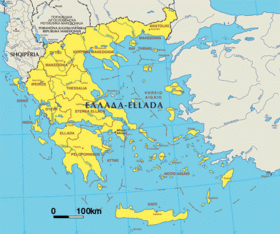Difference between revisions of "Marine Biotechnology in Greece"
Dronkers J (talk | contribs) |
|||
| Line 34: | Line 34: | ||
{{Marinebiotechdisclaimer}} | {{Marinebiotechdisclaimer}} | ||
| − | [[category:Marine Biotechnology]] | + | [[category:Marine Biotechnology country survey]] |
Latest revision as of 10:27, 9 August 2019
Go back to: Home > Strategies, Policies and Programmes > European countries
Overarching science strategies, plans and policies
There are no specific Marine Biotechnology strategies, plans or policies in Greece. General orientation of scientific research is provided by an overarching Strategy for Research, Technology and Innovation. The marine and biotechnology research components are not further elaborated in a policy or strategy.
- Strategic Plan for Development of Research Technology & Innovation in the context of the National Strategic Reference Framework of the General Secretariat for Research & Technology (GRST)[1].
Research funding schemes and programmes
The General Secretariat for Research & Technology (GRST) is the main actor in innovation-policy implementation through funding schemes and legal instruments. The marine and biotechnology research components are not further elaborated in a policy or strategy nor supported by dedicated programmes. Instead they are supported through a national policy directed generic instrument.
Research priorities for marine biotechnology research
n/a
Strategic documents
An outdated but interesting inventory and analysis of national public policies that stimulate research in biotechnology, its exploitation and commercialisation by industry in Europe in the period 2002–2005 can be found at [2].
Infrastructures and coordination and support capacities / initiatives
- In 2012,Greece operates 2 local/coastal vessels of 26,1 and 33m; 1 regional vessel of 50m (Pitheas); 2 oceanic of 61,5 and 63m registered at the European Research Vessels Infobase [3].
- In 2012, Greece maintains about 5 large marine research equipments registered in the European large Exchangeable instruments database [3].
- Key aquaculture experimental and research facilities in Greece include
- Faros Field Station (HCMR, Institute of Aquaculture)
- School of Pharmacology (University of Athens) - Vassilis roussis – also involved in marine projects
- Institute of Molecular Biology and Biotechnology (IMBB), Krete[4]. Dr. Dimitri Kasetzopoulos
Major initiatives
- Greek participation in FP7 project Seabiotech
- HCMR participation in FP7 project MicroB3
- Korres company working on cosmetics including from marine origin.
References
Disclaimer
This country profile is based on available online information sources and contributions from various country experts and stakeholders. It does not claim to be complete or final, but should be considered as a dynamic and living information resource that will be elaborated, updated and improved as more information becomes available, including further inputs from experts and stakeholders. The information on this page is based on information initially compiled by the CSA MarineBiotech Project (2011-2013) and updated by the Marine Biotechnology ERA-NET (2013-2017).
